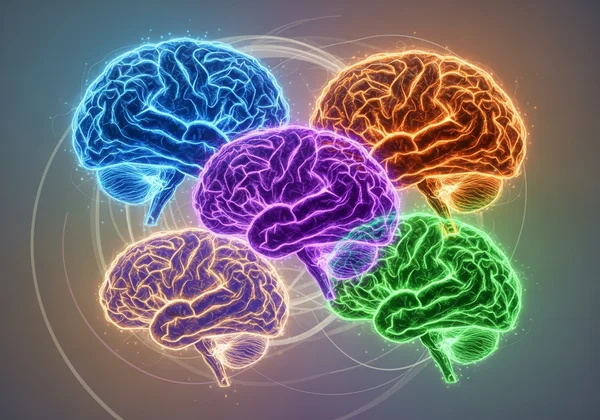Is Your Child Neurodivergent? Signs, Support & Neurodivergent Test Guide
November 13, 2025 | By Morgan Hayes
As a parent, you are the foremost expert on your child. You notice the subtle shifts in their mood, their unique quirks, and the incredible ways their mind works. So, when you start wondering if their experiences align with neurodivergence, it comes from a place of deep love and a desire to understand. You might be asking yourself, what are the signs of being neurodivergent? This question is a brave first step on a path toward deeper connection and support.
This guide is here to walk alongside you. We will explore common indicators of neurodivergence across different childhood stages, provide empowering strategies to support your child, and clarify the next steps. This journey of discovery can feel overwhelming, but you are not alone. A great starting point can be a gentle, insightful neurodivergent test designed to provide clarity and open up conversations.
Recognizing Signs of Neurodivergence in Children
Neurodivergence is a broad term that describes natural variations in the human brain. It includes conditions like Autism (ASD), ADHD, and Dyslexia. Recognizing signs is not about finding a problem, but about understanding your child’s unique operating system so you can help them thrive.

Early Childhood Indicators (Ages 0-5)
During these foundational years, you might notice differences in how your child interacts with the world. Remember, every child develops at their own pace, but certain patterns can be insightful.
-
Social Interaction: May prefer to play alone, have difficulty making eye contact, or seem to be in their own world. They might not respond to their name as consistently as peers.
-
Communication Patterns: You might observe delayed speech, echolalia (repeating words or phrases), or a very literal understanding of language.
-
Repetitive Behaviors: Stimming, such as hand-flapping, rocking, or spinning, can be a way to self-soothe or express excitement. A strong attachment to routines and distress over small changes are also common.
-
Sensory Sensitivities: Your child might be hypersensitive to sounds, lights, or textures (like tags on clothing). Conversely, they could be hyposensitive, seeking intense sensory input like tight hugs or constant movement.

School-Age Observations (Ages 6-12)
As social and academic demands increase, neurodivergent traits can become more apparent. The classroom environment often highlights differences in learning and interaction styles.
- Academic Challenges: Difficulties with focus, organization, and following multi-step instructions may arise. Some children may excel in a specific subject of intense interest while struggling in others.
- Peer Relationships: Navigating friendships can be complex. Your child may have trouble understanding social cues, sarcasm, or the unwritten rules of playground politics.
- Emotional Regulation: Big emotions are normal for kids, but a neurodivergent child might experience them more intensely and have a harder time calming down after being upset.
- Special Interests: A deep, passionate, and highly focused interest in a specific topic is a hallmark of many neurodivergent minds. This is not just a hobby; it’s a source of great joy and expertise.
Adolescent Experiences (Ages 13-18)
The teenage years are about forming an identity, and for a neurodivergent teen, this can be an especially complex process.
- Executive Function Difficulties: The part of the brain responsible for planning, prioritizing, and starting tasks—executive function—can be a major hurdle. This can look like a messy room, forgotten homework, or difficulty managing time.
- Social Navigation: The social world of teens is nuanced and often exhausting. Your teen might engage in "masking"—consciously hiding their neurodivergent traits to fit in—which can lead to burnout.
- Identity and Self-Awareness: Many teens start to recognize that their brains work differently. They may feel isolated or misunderstood, making validation and acceptance at home incredibly important.
Beyond Common Labels: Understanding the Neurodiversity Spectrum
It’s crucial to see neurodivergence not as a list of deficits, but as a spectrum of human experience. It’s about different wiring, not defective wiring. This perspective shift is the foundation of effective support.
What Does "Neurodivergent" Truly Mean for Kids?
For a child, being neurodivergent means their brain processes information, perceives the world, and interacts with their environment in a way that differs from the "neurotypical" majority. It isn't better or worse, simply different. Explaining this concept in terms of natural brain variations can help demystify their experience and build self-esteem. It’s the difference between having a Mac in a world designed for PCs—both are powerful computers, they just run on different operating systems.
Celebrating Unique Strengths & Perspectives
Neurodivergent minds come with incredible strengths. By focusing on these, you empower your child to see their differences as assets.
-
Deep Focus: The ability to hyperfocus on a special interest can lead to extraordinary expertise.
-
Creativity: Many neurodivergent individuals are innovative, out-of-the-box thinkers who see patterns and solutions others miss.
-
Honesty and Loyalty: A direct communication style and a deep sense of justice often make for intensely loyal and trustworthy friends.
-
Unique Problem-Solving: Approaching problems from a different angle can lead to groundbreaking ideas.

Empowering Strategies for Parenting a Neurodivergent Child
Your role is not to "fix" your child, but to create an environment where their unique brain can flourish. This involves adapting your approach and advocating for their needs.
Creating a Supportive Home Environment
Your home should be a safe harbor. A predictable routine can reduce anxiety significantly. Consider sensory needs by providing noise-canceling headphones, a weighted blanket, or a quiet space for decompression. Celebrate their interests and build their confidence by creating opportunities for them to succeed on their own terms. Creating this supportive home environment is one of the most powerful things you can do.
Effective Communication and Connection
Connect with your child through their passions. If they love trains, learn about trains. Use clear, direct language and avoid idioms or sarcasm that might be confusing. Validate their feelings, even if their reaction seems disproportionate to the situation. Saying "I see you're really upset right now" is more powerful than saying "It's not a big deal."
Advocating for Your Child in Education & Beyond
You are your child’s most important advocate. Work collaboratively with teachers to develop an Individualized Education Program (IEP) or 504 plan if needed. Educate others—family, friends, and coaches—about your child’s needs and strengths. Building a strong support network for both you and your child is key to long-term success.
Your Next Steps: From Initial Exploration to Professional Guidance
If what you've read resonates with your family's experience, you may be wondering what to do next. The journey starts with understanding, not labeling.
When to Consider a Neurodivergent Screening Test for Kids
Online tools can be a helpful, low-pressure first step. A neurodivergent screening like the one offered on our platform is not a diagnostic tool. Rather, it’s designed to provide initial insights based on your observations. It can help organize your thoughts and provide a framework for a more productive conversation with a professional. You can get initial insights quickly and easily.

Navigating Professional Assessment and Diagnosis
A formal evaluation from a qualified professional—such as a developmental pediatrician, neurologist, or psychologist—is the only way to get a clinical diagnosis. This professional assessment typically involves detailed interviews, questionnaires, and direct observation. A diagnosis can unlock access to vital resources, therapies, and school accommodations.
Building Your Support System and Resources
Connect with other parents of neurodivergent children through local or online support groups. Organizations like the Autistic Self Advocacy Network (ASAN) and CHADD offer valuable resources. The journey is easier when you have a community that understands. If you're ready to take the first step in understanding, consider our free neurodivergence test.
Embracing Your Child's Unique Path
Parenting a neurodivergent child is a journey of learning, adaptation, and profound love. By seeking to understand their world, you are giving them the greatest gift of all: unconditional acceptance. Recognizing their unique traits is the beginning of empowering them to harness their strengths and navigate their challenges with confidence.
If you’re ready to explore further, taking a free neurodivergent test can be an illuminating and validating step. It’s a simple way to begin mapping your child’s unique neurological landscape and start a conversation that can change their life.
Frequently Asked Questions About Childhood Neurodiversity
What are the common signs of being neurodivergent in children?
Common signs vary by age but often include differences in social communication, intense special interests, sensory sensitivities (to sounds, textures, etc.), repetitive behaviors (stimming), and challenges with emotional regulation or executive functions like planning and organization.
How do you get tested for neurodivergence if you suspect your child is neurodivergent?
The formal process begins with speaking to your pediatrician, who can refer you to a specialist like a developmental pediatrician, child psychologist, or neurologist. While a preliminary online neurodivergent test can offer initial insights, a formal diagnosis requires a comprehensive professional evaluation.
Can a child be neurodivergent and not have ADHD or autism?
Absolutely. Neurodiversity is a broad umbrella that also includes dyslexia (reading differences), dyscalculia (math differences), Tourette's Syndrome, and more. Each neurotype has a unique profile of strengths and challenges.
What are the strengths of a neurodivergent brain in children?
Neurodivergent children often possess remarkable strengths, including intense focus and expertise in areas of interest, exceptional creativity, strong pattern recognition skills, loyalty, and a unique, honest perspective on the world. Viewing these traits as strengths is key to fostering their self-esteem and potential.